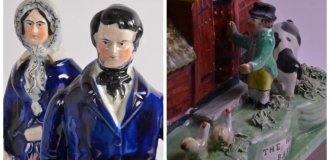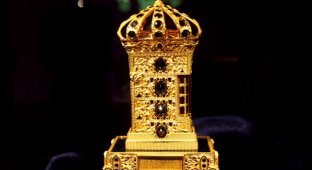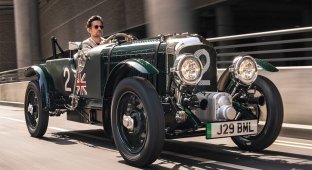Why Louis XIII Needed Musketeers and Why the French Didn't Like Them (11 photos)
In 1600, the King of France Henry IV created a select company of carabiniers for his personal guard, which included nobles armed with special weapons, light carbines. 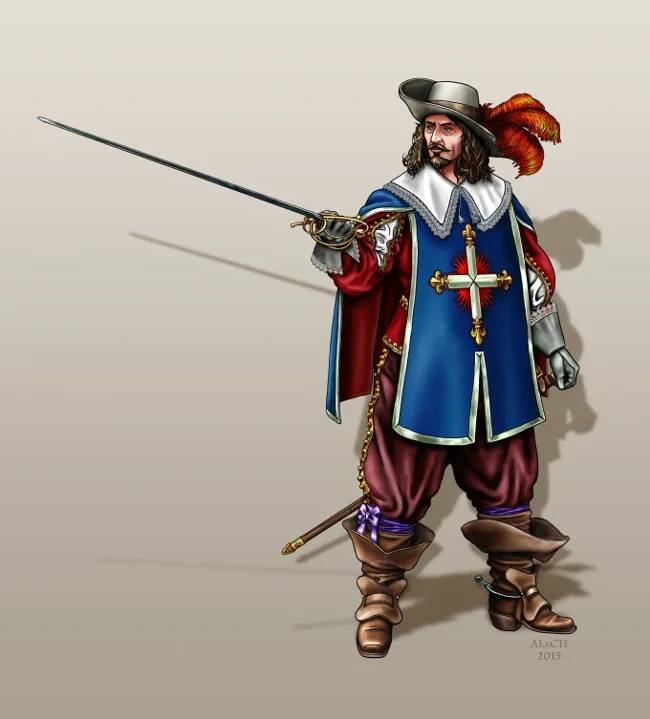
A little history
In 1600, the King of France Henry IV created a select company of carabiniers for his personal guard, which included nobles armed with special weapons, light carbines. In 1622, Louis XIII ordered the replacement of carbines with long-barreled muskets, after which they were called "musketeers of the royal military house", or simply "royal musketeers".
When formed, the company consisted of 100 private musketeers. From October 3, 1634, the king himself was considered the captain of the company, and its actual commander held the rank of captain-lieutenant; this position was occupied by Count Jean-Armand de Peyre, seigneur, from 1643 Count de Troisville, otherwise de Treville). De Treville was a Gascon, as a result of which a significant part of the company soon consisted of fellow countrymen of the commander. Only people from noble families, albeit impoverished ones, could become musketeers. So serving the king brought them a certain income, and, of course, glory. 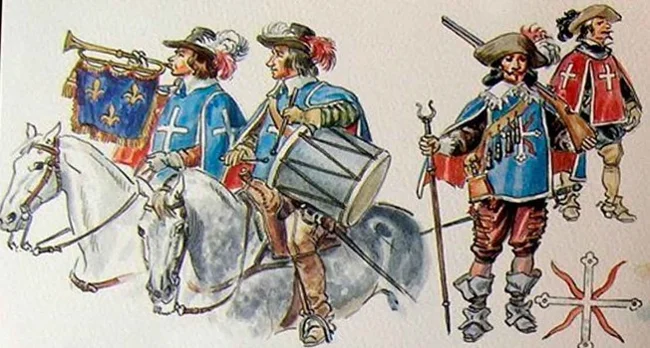
The musketeers' uniform was very lush and beautiful. Its distinctive sign was a short azure cloak with silver braid and white crosses sewn onto it in front, back and side. The cross was made of velvet and had golden royal lilies on the ends and scarlet trefoils on the crosshairs.
The musketeer's equipment, in addition to a horse, which must be gray, and a musket with a bipod, consisted of a sword, a broadsword (for mounted combat), a pair of pistols, a dagger (a dagger for the left hand) and a sling (berendeyka) made of buffalo leather with cartridges attached to it, a powder flask, a bullet pouch and wicks; later, a baguette was also included in the set. The musket was issued by the treasury, the rest of the weapons and equipment, a horse and a servant required for military needs, the musketeer had to buy himself. For many impoverished nobles, this was ruinous, so in the time of de Treville, and later d'Artagnan, a kind of "musketeer mutual aid fund" existed in the company. When wealthy comrades made voluntary contributions. The obligatory "tax" on gambling winnings was also deducted here.
The "Musketeers of the King's Military Household" were part of the "Guards Outside the Louvre", that is, the king's outer guard (like a modern bodyguard); they were to accompany the king on his outings and walks, riding two at a time in front of the rest of the guard; they also accompanied the king on campaigns, if he participated in them. 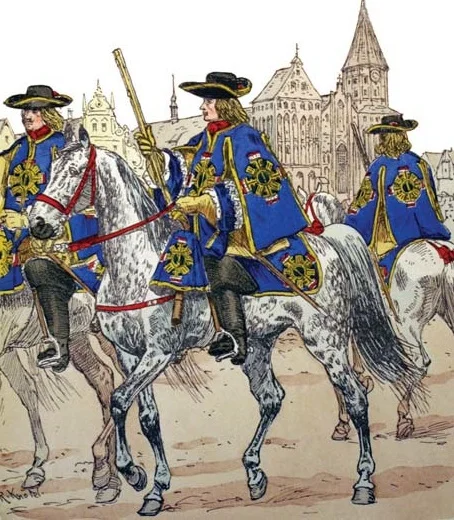
After the death of Louis XIII, Cardinal Mazarin attempted to remove de Treville from his position as commander of the company in order to appoint his nephew, Philippe Mazarin, in his place. His attempt, however, failed, but in 1646 he still achieved the dissolution of the company. It was recreated in 1657 under the leadership of the Duke of Nevers. At the time of their resumption, there were 120 musketeers.
Why did Louis XIII need musketeers
Technically, all soldiers armed with muskets were musketeers. But those who wore this designation as a badge of honor made up the personal guard of the French king Louis XIII. It was a turbulent time for France. Protestants, known as Huguenots, opposed the rule of the Catholic Church. Fierce religious wars broke out. The struggle for power between the king, the nobility and the church was constant, and assassination attempts were not uncommon.
Louis XIII became King of France when he was just 9 years old. With full power, he besieged the Huguenots in the port city of La Rochelle in the 1620s with the help of the Musketeers. They were formidable in battle, and their training and morale gave them a decisive advantage.
To become a Guard Musketeer, you had to be an aristocrat or nobleman - not necessarily rich, but connected to the French ruling class. Almost all recruits were nobles, although military prowess remained the main requirement. Men joined the regiment at the age of 17 or 18. Recruits were predominantly Gascons, who were known for their bravery, tenacity, and cunning.
Louis XIII's Musketeers were a force that was a combination of secret service and special forces. Their main duty was to protect the king and his family. In times of frequent conspiracies, this was considered a difficult task.
In peacetime, the Musketeers served as an escort for the King and staged mock battles as court entertainment. Louis XIV especially loved to show them off at military reviews. They accompanied the King to the front during wartime, led assaults during sieges, carried out dangerous maneuvers, and served as sentries at the King's door.
A sort of universal soldiers, the French version of Ivan the Terrible's oprichniks. They were specially formed from the most loyal nobles to "crush" the all-powerful French aristocracy and protect the leader from offended barons, assassination attempts, and intrigues.
People's attitude
In Paris, the Gascons & Musketeers were not liked (just like the Caucasians in Moscow). Militancy is good in battle, in the city it was only a nuisance. The residents of the capital were offended by the rude jokes, bragging and aggressiveness of the musketeers, but no one dared to openly oppose the king's favorites. But they became the constant heroes of plays: writers loved to depict them in caricature. A petty nobleman, greedy for money, obsessed with questions of honor and lying for the love of art - this is the literary image of the Gascons that had developed by the 18th century. At the same time, the expression "musketeer manners" came into use, meaning rude and impudent behavior. Musketeers were characterized by people with the most difficult character and low moral qualities.
Musketeers could go into a tavern, order whatever their heart desired, and not pay. Try to demand from him - you can pay with your life. A musketeer could easily kill for a sidelong glance. 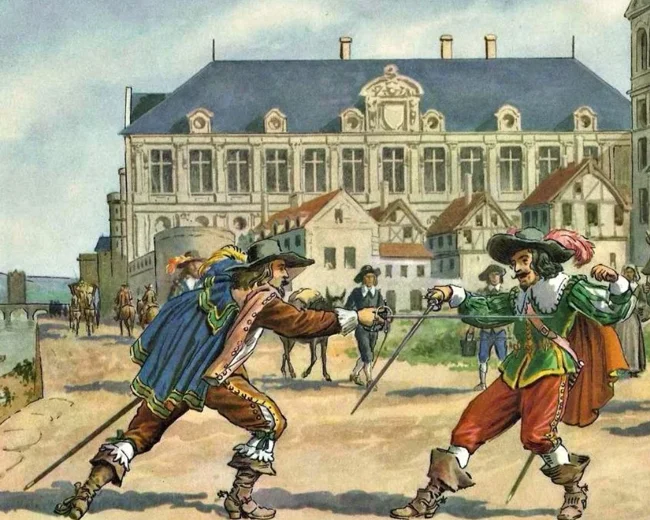
They behaved extremely insolently with the city's residents. And they were not ready to change even for the sake of women, showing them all their disrespect. Therefore, Parisian women preferred not to cross paths with the musketeers and always avoided them.
Living in Paris and the status of an elite guard company left its mark on the lives of the musketeers. Before the reign of Louis XIV, they did not have their own barracks, so they had to live in rented apartments. Which added to the problems of the Parisians, since the young, energetic young guardsmen loved to drink and were always ready for adventure.
For example, the episode with Madame Bonacieux was copied by Dumas from a real situation in the life of Charles de Castelmore, who flirted with the wife of his landlord. However, instead of a stupid and cowardly haberdasher, the husband turned out to be a former military man. Charles once almost died when a bullet from the deceived husband's pistol flew a millimeter from his head. 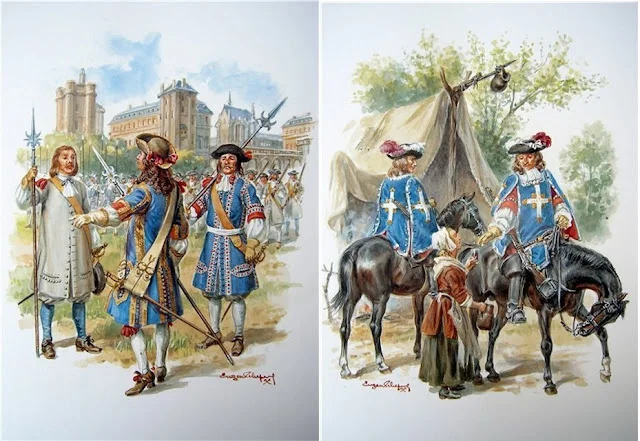
Besides alcohol and women, the most terrible and widespread hobby of the royal musketeers was dueling. Periodically, the musketeers specially went out into the city at night to look for adventure and stab someone in a duel.
The military did not disdain to fight civilians, not at all embarrassed by the fact that the forces were unequal. In 1768, the police detained three musketeers who attacked a coachman, a blacksmith and a shoemaker, maiming them so much that a surgeon was needed. Needless to say, neither the artisans themselves nor their wives had warm feelings for those who could attack a person on the street for fun?
The hobby became especially dangerous after Cardinal Richelieu began to decisively fight against murder (he logically believed that nobles should die in wars for the king, and not in a gateway at the point of a sword). It must be said that in the 17th century, more young nobles died in duels than in wars. Even one of the prototypes of Dumas' heroes, Armand de Siègues d'Athos d'Hauteville, was killed in a duel at the Pré-aux-Clercs market on December 21, 1643. 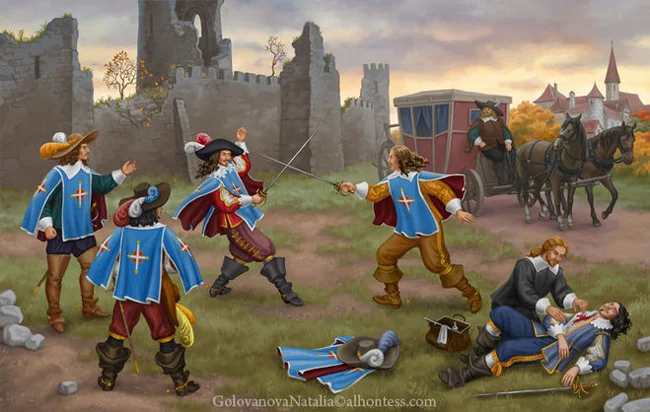
After the authorities took decisive measures, duels went underground. The word "duel" itself disappeared from use, because simply challenging someone to a duel could land you on the chopping block and lose your noble title. However, quarrels did not go away, troublemakers just learned "Aesopian" language. If a little business was planned, the instigator would tell his opponent that he intended to take a walk in a secluded place at such and such a time. After which there would be a "chance" meeting and a fight, and if they were detained, both could make the excuse that they were defending themselves and were simply attacked.
Due to the difference in patronage and titles, sometimes confrontations arose between the musketeers. The most famous of them, the "war of lace", occurred in the second half of the 17th century. The musketeers competed in luxury and tried to tease each other in every possible way. In 1680, the grandson of Louis XIV, the Duke of Burgundy, decided to become a musketeer. The two parts almost fought over which one he would serve in, so the king ordered the duke to serve in both at the same time. 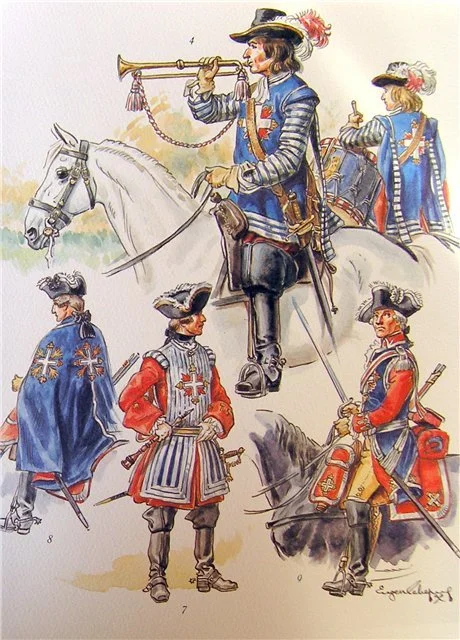
The musketeers' thirst for money arose for objective reasons. A nobleman had no right to engage in physical labor, and therefore everyone who did not have their own estate or the desire to manage it faced a simple choice: either serve the church or make a military career. The latter, alas, rarely helped the musketeers get rich: it was believed that aristocrats were already wealthy, and therefore they were given only muskets. Everything else had to be bought by themselves: from swords to horses (necessarily white or gray).
The salary of an ordinary musketeer was 300 livres per year. For comparison: a drayman earned 30 livres per month (360 per year), a shepherd - 28 livres (336 per year). The musketeers had to live on 38 sous per day: it was enough only for food - and not the best.
Young soldiers were constantly looking for money: they begged their relatives, borrowed and re-borrowed from each other, and often became victims of usurers. 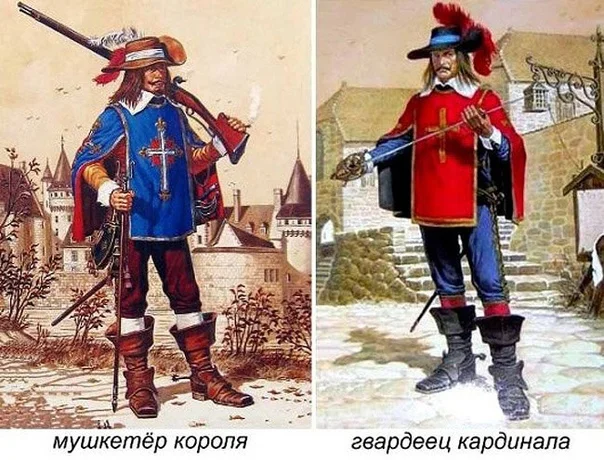
Women
The courage and assertiveness of the "gray" Gascon musketeers was needed only in battle. In everyday life, they tried to avoid them because of their cocky character and aggressive behavior. They also gravitated toward big money and were very stingy. Here, everything is more or less clear: the musketeers came from noble families, so they could not earn a living through physical labor, like ordinary people. They had two paths - to become soldiers or priests.
Many women did not like the impudent manners of the "gray" musketeers. They did not stand on ceremony in communicating with ladies, because they simply did not know etiquette. Representatives of noble families did not want to hear anything about the courtship of rude Gascons. What could the musketeers do? Some of them became regulars of brothels, while others chose silly provincial girls as companions, who did not have special requirements for gentlemen. 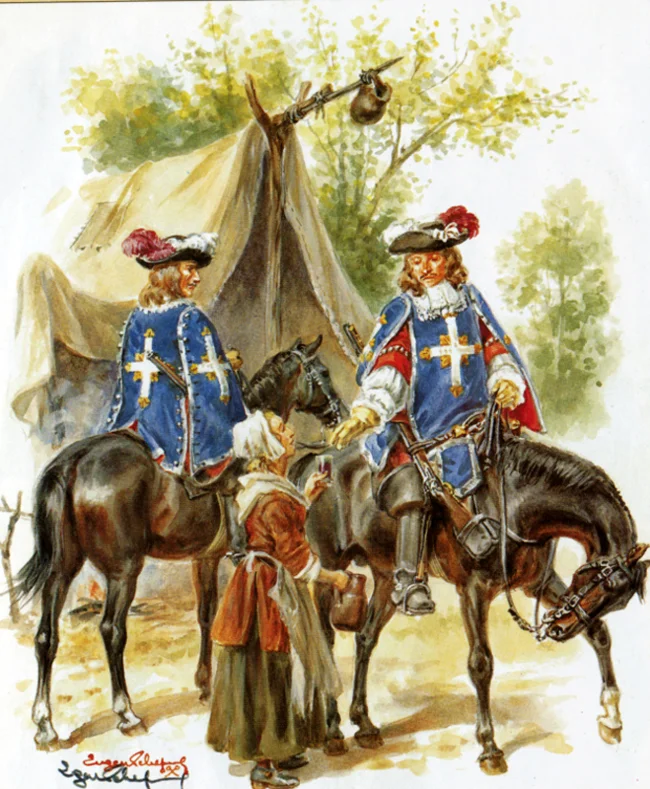
The French women hated them, accustomed to a measured life, it is not difficult to understand them - the musketeers could easily kill their husbands, and take the girls themselves by force, so to speak, for a night of love
And if there was a pretty lady nearby, they could boldly take her away with them. If someone entered into a squabble - a mortal fight began. That is why the owners of restaurants and rented apartments literally shuddered at the mere word "musketeer".
Musketeers and guardsmen
Cardinal Richelieu's guardsmen were essentially the same musketeers. King Louis allocated his best and most loyal soldiers to serve the cardinal and protect him. This happened after the Marquis da Chalais, Duke of Orleans, who was eager to overthrow the king, who was his brother, organized an assassination attempt on the cardinal, who was protecting Louis's interests. Thus, 50 musketeers went over to the cardinal's service in gratitude. For comparison, Louis had only 150 musketeers. 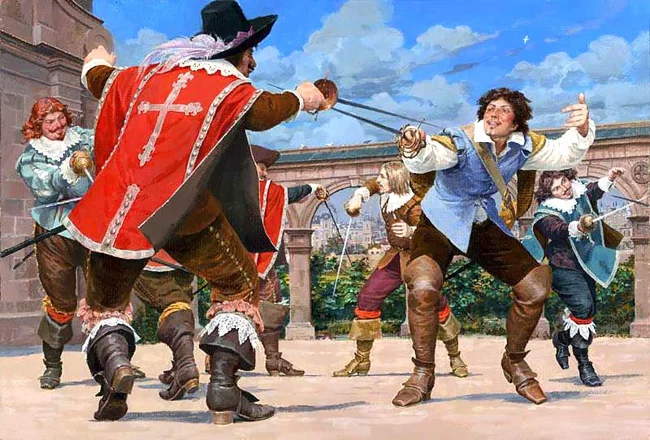
Both the guards and the musketeers were nobles, but Richelieu began to develop and increase the guard as his state influence strengthened, paying attention not only to the title, but also to personal qualities - courage, responsibility and loyalty. The number of guards reached the royal 150, and over time, it more than doubled. The best of them were considered to be one hundred and fifty horse guards.
Where did such competition and almost hatred between the two units, subordinate to statesmen who actually stood on the same side, come from? The explanation is quite simple, and even somewhat banal.
The cardinal did not skimp and paid his guards well, which the musketeers could not boast of. Of course, the drill in Richelieu's unit was stronger, but military people also write this down as an advantage. In addition to the salary, the guards' equipment was also of higher quality and more complete.
In this regard, the musketeers simply envied the guards, hence the number of duels and fights. The king turned a blind eye to this confrontation and even encouraged the musketeers' cocky behavior. But the reserved and reasonable Richelieu punished the guards for violating discipline and clashes with the musketeers. 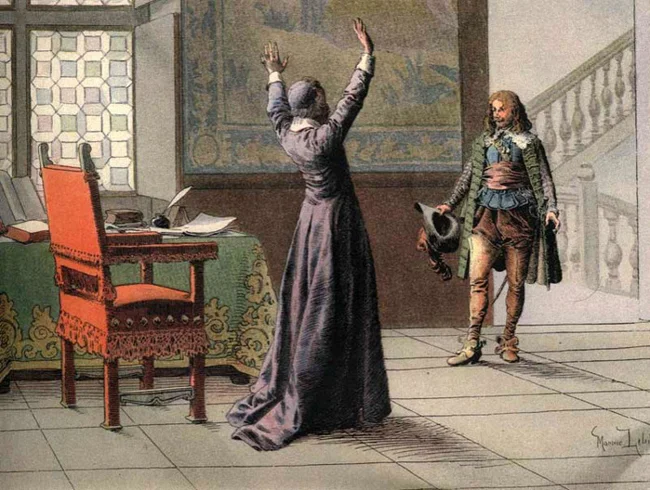
In order not to lose their well-paid jobs and prestigious military service, the guards simply avoided meeting the musketeers. This is how the stereotype of their cowardice appeared, which was vividly reflected in the film adaptation of Dumas's novel. In fact, ordinary caution and prudence were behind such behavior. And the musketeers became heroes - their audacity and recklessness, naturally, are more suitable for literary works and cinema.
By the way, the Cardinal's Guard ceased to exist after Richelieu passed away. The Guardsmen again became Musketeers in the service of the King. It can be assumed that conflicts between the former Guardsmen and Musketeers continued anyway, because the bravado and cockiness had to be put somewhere.
